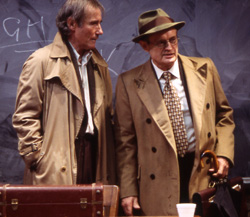
Jim Dale and David McCallum in Comedians
(Photo © Carol Rosegg)
Jan 16, 2003
Comedians
Reviewed By: Philip Hopkins
With a terrific set by Derek McLane, excellent performances, sharp direction,
commendable attention to detail, and a script that made a splash in its London
and Broadway premieres in the mid-'70s, how could Comedians go wrong? Unfortunately,
that script -- by the talented and politically astute British stage and screen
writer Trevor Griffiths -- has not aged well.
As a vessel for the talents of Raúl Esparza (most recently lauded for
his Broadway turn as Cabaret's Emcee) and for those of Tony-winner Jim Dale
(Barnum), the New Group's current Off-Broadway production of Comedians is serviceable.
But, rather than resonating with contemporary audiences, the play does little
more than provide an interesting look at a moment in time when angry young British
playwrights were running out of things to say.
This isn't Dale's first encounter with Comedians. Starring now as Eddie Waters, a washed-up British comic who never lived up to his once enormous potential and now teaches a night school class to younger standups in Manchester, Dale appeared in the play's Los Angeles premiere in 1977 as one of the students. Griffiths' ideas might have held some currency then, but it's all that Dale, Esparza and company can do to breathe life into them today.
The characters are believable enough, if too numerous to offer much depth. Belfast native George McBrain (David Lansbury) has enrolled in this class, taught by the semi-famous Waters, with his sights set on fame and fortune. The more amiable Dublin jokester Mick Connor (James Beecher) has his sights set on the same goal but is less aggressive in attaining it, refusing to indulge in racially and sexually tinged routines. The other four students all walk the same line, and that is the play's point; it's essentially a screed about political correctness, and it includes several eloquent speeches by Waters about steering clear of the lowest common denominator. When Esparza's character, Gethin Price -- the class's most original and volatile comic -- recites a blue limerick, Waters castigates him, saying: "It's a joke that hates women."
If all of this seems quaint in an era when female comics can make men blush three times over, Waters later explains that worthy jokes don't exploit but expose the prejudices and tensions beneath them, taking the audience to a more civilized place: "We work through the laughter, not for it," he says.
As the first act moves along, the drama of the situation emerges slowly. We learn that an agent of Waters's acquaintance (played by David McCallum) is coming that night to Manchester to evaluate the group in live performance. That we don't really mind the wait is testimony to the pacing of the production and the ensemble dynamics generated by director Scott Elliott. The fact that Waters's relationship with the agent has been a tense one points up the price that Waters has paid for his integrity, which is essentially defined as not telling jokes of the type that Richard Pryor or Eddie Murphy (not to speak of Andrew Dice Clay) rode to success.

Jim Dale and David McCallum in Comedians
(Photo © Carol Rosegg)
The second act begins in the performance venue, as we see the various class
clowns in routines worthy of several good laughs -- though a few of those routines
have been apparently changed at the last minute to suit the agent's crass tastes.
A piano player (Gordon Connell) provides accompaniment for the desperate comedians.
The last routine, by Price, is disturbing, abstract, Andy Kaufmanesque, and
ultimately seems strange for its own sake. The act may have convincingly represented
an edgy sensibility at the time of the play's premiere, but now it seems self-indulgent
and self-important. Still, Esparza performs it with virtuosic intensity.
Back in the classroom later that same evening, the two comics who crossed the line of good vs. bad taste are offered contracts by the agent; one of them is a Jewish club owner named Sammy Samuels (Allan Corduner), a character bordering on just the kind of stereotype that Griffiths' play seems to warn against. As each sad sack files out of the classroom, one feels a buildup to the inevitable confrontation between angry young comic and shattered, idealistic mentor. Here, Griffiths goes to great lengths in an attempt to give his script heft; included in the final scene are a lament for the death of the British music hall circuit, a diatribe from Price about a system that treats comics with no respect, and -- of all things -- the Holocaust.
Certainly, our cultural atmosphere is tempered or reinforced by what is considered
comedy. But the play does not earn the gravity it seeks in telling us how Waters,
in a postwar visit to Germany, realized that the most important thing he could
do in working against future gas chambers and other such horrors was to train
young comics to present kinder and gentler material. In post-millennium America,
this seems a strange lesson to draw from Buchenwald. The racially, ethnically,
and sexually blunt humor of everything from In Living Color to South Park to
Austin Powers suggests that the debate on what is or is not sayable has become
vastly more complex since Griffiths wrote Comedians. And that, in turn, suggests
that it would be better if a new play on this subject were written and produced,
rather than this musty old work being revived.